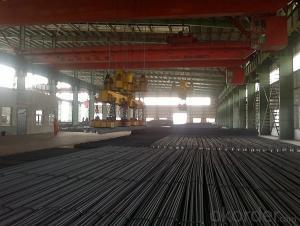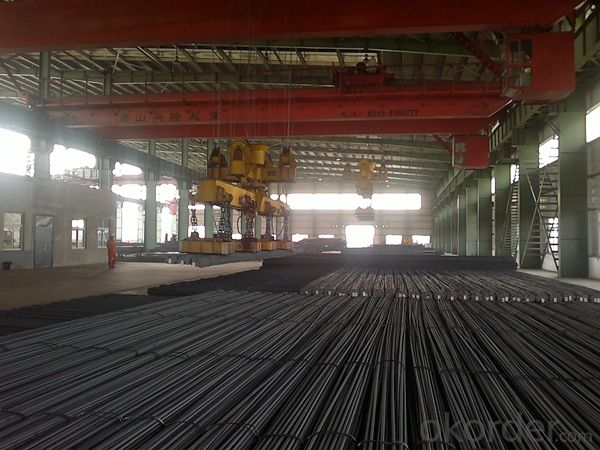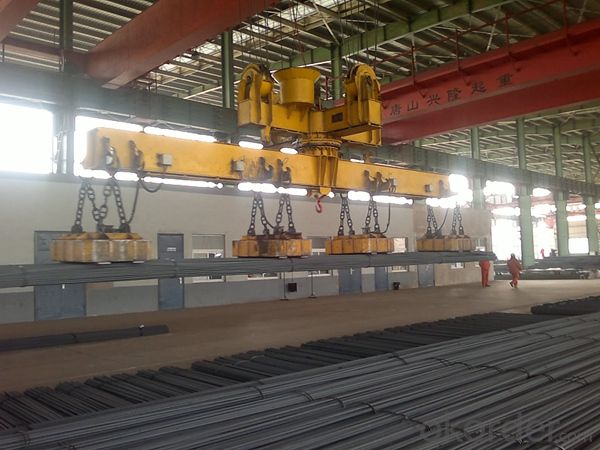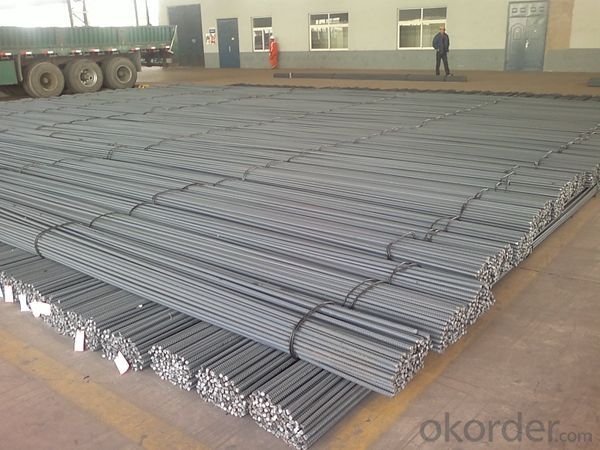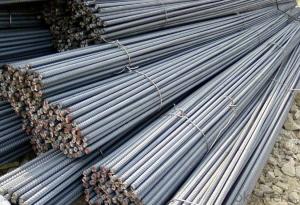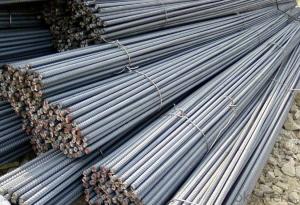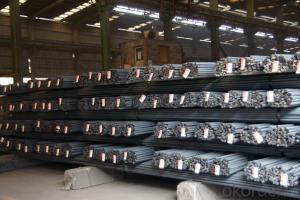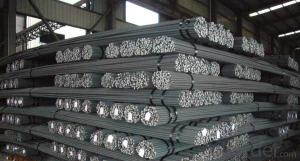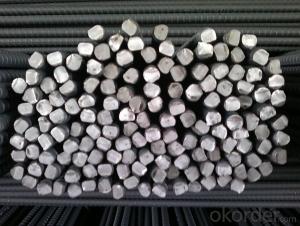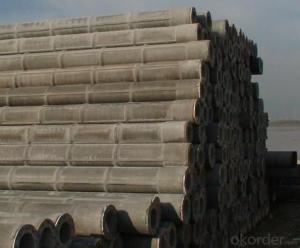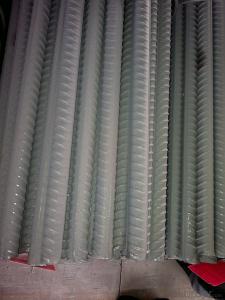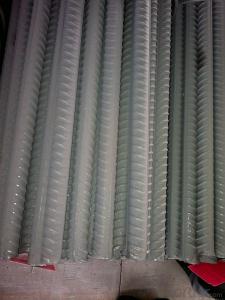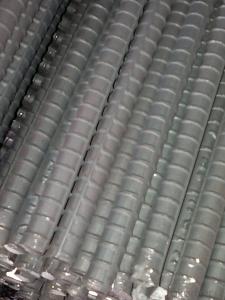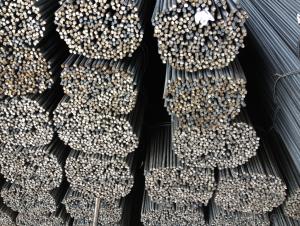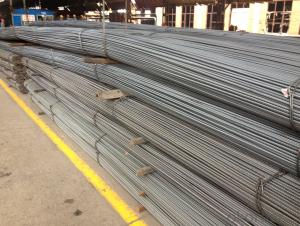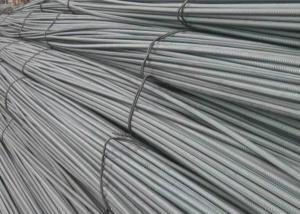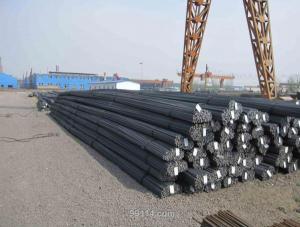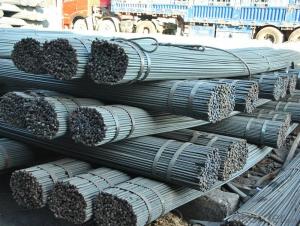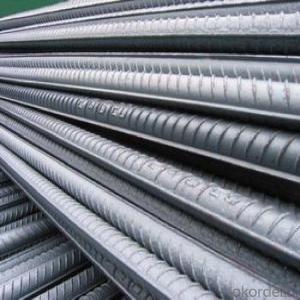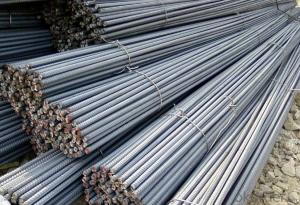Mild Hot Rolled Deformed Steel Rebars for Construction
- Loading Port:
- Tianjin
- Payment Terms:
- TT or LC
- Min Order Qty:
- 25 m.t.
- Supply Capability:
- 200000 m.t./month
OKorder Service Pledge
OKorder Financial Service
You Might Also Like
Product Description:
We are offering Mild Hot Rolled Deformed Steel Rebars for Construction at great prices with worldwide shipping. Our supplier is a world-class manufacturer of steel, with our products utilized the world over. OKorder annually supplies products to European, North American and Asian markets. We provide quotations within 24 hours of receiving an inquiry and guarantee competitive prices.
Product Applications:
Mild Hot Rolled Deformed Steel Rebars for Construction are ideal for structural applications and are widely used in the construction of buildings and bridges, and the manufacturing, petrochemical, and transportation industries. Deformed bar is widely used in buildings, bridges, roads and other engineering construction. Big to highways, railways, bridges, culverts, tunnels, public facilities such as flood control, dam, small to housing construction, beam, column, wall and the foundation of the plate, deformed bar is an integral structure material. With the development of world economy and the vigorous development of infrastructure construction, real estate, the demand for deformed bar will be larger and larger..
Product Advantages:
OKorder's Mild Hot Rolled Deformed Steel Rebars for Construction are durable, strong, and resist corrosion.
Main Product Features:
· Premium quality
· Prompt delivery & seaworthy packing (30 days after receiving deposit)
· Corrosion resistance
· Can be recycled and reused
· Mill test certification
· Professional Service
· Competitive pricing
Specifications of Mild Hot Rolled Deformed Steel Rebars for Construction:
Standard | GB UK USA | HRB335 HRB400 HRB500 G460B, B500A, B500B,B500C GR40, GR60 | |
Diameter | 6mm,8mm,10mm,12mm,14mm,16mm,18mm,20mm, 22mm,25mm,28mm,32mm,36mm,40mm,50mm | ||
Length | 6M, 9M,12M or as required | ||
Payment term | TT or L/C | ||
Trade terms | FOB, CFR, CIF | ||
Application | Building, construction | ||
Each bundle weight | 2-3MT, or as required | ||
Type | Hot rolled steel rebar | ||
Brand name | OKORDER | ||
Theoretical weight and section area of each diameter as below for your information:
Diameter(mm) | Section area (mm²) | Mass(kg/m) | Weight of 12m (kg) | Pcs/ton |
6 | 28.27 | 0.222 | 2.664 | 375.38 |
8 | 50.27 | 0.395 | 4.74 | 210.97 |
10 | 78.54 | 0.617 | 7.404 | 135.06 |
12 | 113.1 | 0.888 | 10.656 | 93.84 |
14 | 153.9 | 1.21 | 14.52 | 68.87 |
16 | 201.1 | 1.58 | 18.96 | 52.74 |
18 | 254.5 | 2.00 | 24 | 41.67 |
20 | 314.2 | 2.47 | 29.64 | 33.74 |
22 | 380.1 | 2.98 | 35.76 | 27.96 |
25 | 490.9 | 3.85 | 46.2 | 21.65 |
28 | 615.8 | 4.83 | 57.96 | 17.25 |
32 | 804.2 | 6.31 | 75.72 | 13.21 |
36 | 1018 | 7.99 | 98.88 | 10.43 |
40 | 1257 | 9.87 | 118.44 | 8.44 |
50 | 1964 | 15.42 | 185.04 | 5.40 |
Deformed Steel Rebar in warehouse
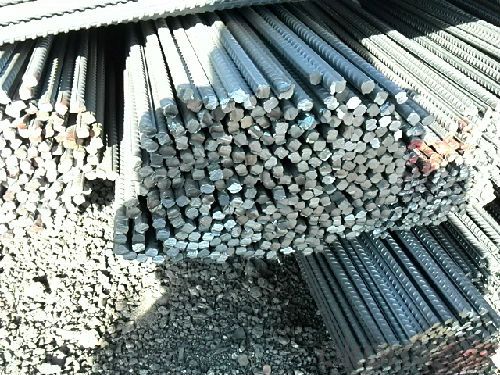
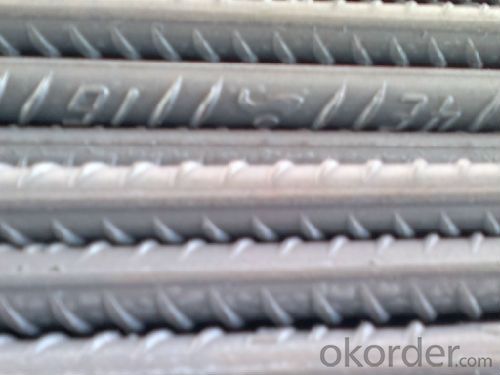
Packaging & Delivery of Mild Hot Rolled Deformed Steel Rebars for Construction:
Packaging Detail: products are packed in bundle and then shipped by container or bulk vessel, deformed bar is usually naked strapping delivery, when storing, please pay attention to moisture proof. The performance of rust will produce adverse effect.
Delivery Detail: within 45 days after received advanced payment or LC.
Label: to be specified by customer, generally, each bundle has 1-2 labels
Note:
1. Our products are produced according to national standard (GB), if not, supply according to national standards (GB) or agreement as customer required.
2. Other Grade and Standard Deformed Steel Bar we can supply:
Grade: GR40/GR60, G460B/B500A/B500B/B500C,BST500S
Standard: ASTM, BS, DIN
The Minimum Order Quantity of these products is high, and need to be confirmed.
3. We can not only supply Deformed Steel Bar; if you need anything about building materials, please contact us for further information.
4. Please send us your detail specifications when inquire. We will reply to you as soon as possible. We sincerely hope we can establish a long stable business relationship.
FAQ:
Q1: What is the normal tolerance of Hot Rolled Mild Steel Angle Beams for Structures and for Buildings?
A1: Normally 3%-5%, but we can also produce the goods according to the customers' requests.
Q2: Can fit in the containers of 20inches the steel beams of 6M?
A2: No proble, we can put them into the containers in the form sideling.
Q3: The products are invoicing on theoritical weight or on actual weight?
A3: We can do it in both manners, according to the customers' request
- Q: Are steel rebars suitable for use in high-temperature applications?
- Steel rebars are generally not suitable for use in high-temperature applications. Although steel is a strong and durable material, it has limitations when exposed to high temperatures. At elevated temperatures, steel can undergo significant reduction in strength and may even experience a loss of structural integrity, leading to potential failures. When steel is exposed to high temperatures, it undergoes a process called thermal expansion, which can cause it to weaken and deform. This phenomenon is particularly prominent in rebars, which are often used as reinforcements in concrete structures. The high temperatures can cause the rebars to expand and exert excessive pressure on the surrounding concrete, leading to cracks and potentially compromising the structure's stability. Additionally, prolonged exposure to high temperatures can result in a loss of the steel's mechanical properties, including tensile strength and load-bearing capacity. This can significantly reduce the rebars' ability to resist external forces and effectively reinforce the concrete. Therefore, it is generally recommended to use alternative materials, such as stainless steel or special alloys, for high-temperature applications. These materials are specifically designed to withstand elevated temperatures without losing their structural integrity. It is important to consult with experts and engineers familiar with high-temperature applications to determine the most suitable materials for specific projects to ensure safety and structural stability.
- Q: What's the difference between finish rolling thread steel and ordinary thread steel?
- To say the difference between the new bridge finish rolling thread steel and ordinary thread steel main difference between finish rolling thread steel: mainly used for high strength, difference is mainly different strength, chemical composition is not the same:Finish rolling thread steel is prestressed steel, and its strength is higher than ordinary thread steel.
- Q: Are there any alternatives to steel rebars?
- Yes, there are several alternatives to steel rebars. One alternative is the use of fiber-reinforced polymer (FRP) rebars, which are made of high-strength fibers embedded in a polymer matrix. FRP rebars offer several advantages over traditional steel rebars, including corrosion resistance, high tensile strength, and lightweight properties. They are also non-magnetic and electrically non-conductive, making them suitable for areas with electromagnetic interference concerns. Another alternative is the use of basalt rebars, which are made from basalt rock fibers. Basalt rebars offer similar benefits as FRP rebars, including corrosion resistance and high tensile strength. Additionally, some manufacturers have developed alternative materials such as bamboo, carbon fiber, and glass fiber rebars, which have also shown promise in certain applications. However, it is important to note that the choice of alternative rebars depends on the specific requirements of a project, and factors such as cost, availability, and local building codes should be considered when selecting an alternative to steel rebars.
- Q: Is the finish steel 3 grade steel?
- The mechanical properties of finishing rolling rebar with GB/T "20065-2006" thread steel bar for prestressed concrete, the prestressed concrete rebar (also known as the finishing rolling rebar, hereinafter referred to as reinforced) the terms and definitions, strength grade, size, shape, weight and tolerances, technical requirements, test method, inspection rules, packaging, mark and quality certificate. The standard applies to the use of hot rolling, after rolling waste heat treatment or heat treatment processes such as the production of prestressed concrete rebar.
- Q: How do steel rebars provide reinforcement to concrete?
- Steel rebars provide reinforcement to concrete by adding strength and durability to the structure. When embedded within the concrete, rebars act as tension members, resisting forces that would otherwise cause cracking or failure. The high tensile strength of steel rebars helps to distribute and absorb load, enhancing the overall structural integrity of the concrete.
- Q: Can steel rebars be used in other construction materials apart from concrete?
- Yes, steel rebars can be used in other construction materials apart from concrete. They can also be utilized in masonry structures, timber frames, and even in composite materials. The high strength and durability of steel rebars make them suitable for reinforcing various construction materials, enhancing their structural integrity and load-bearing capacity.
- Q: How do steel rebars contribute to the overall strength of a structure?
- Steel rebars contribute to the overall strength of a structure by providing reinforcement and increasing its load-bearing capacity. These rebars are embedded within the concrete, forming a bond between the two materials. This combination allows the concrete to resist tension and bending forces, which are weaknesses of the material on its own. By distributing and absorbing these forces, steel rebars enhance the structural integrity of the building, making it more durable and resistant to deformation or collapse.
- Q: Can steel rebars be used in structures with limited construction permits?
- Steel rebars can typically be used in structures with limited construction permits, as they are commonly used in construction due to their strength and durability. However, it is important to consult the specific regulations and limitations outlined in the construction permits. These permits may have restrictions on the types of materials that can be used, including the size and composition of rebars. It is advisable to consult with a structural engineer or the local building authority to ensure compliance with the construction permits and to determine if steel rebars are allowed in the particular structure.
- Q: What is the average lifespan of steel rebars in concrete structures?
- The average lifespan of steel rebars in concrete structures can vary depending on several factors. Generally, if the concrete is of good quality and properly maintained, the rebars can last for several decades. However, exposure to environmental conditions such as moisture, chemicals, and temperature fluctuations can accelerate the corrosion process, leading to a shorter lifespan. In areas with high humidity or proximity to saltwater, rebars may corrode more quickly. Additionally, poor construction practices, such as inadequate concrete cover or improper placement of rebars, can also impact their lifespan. Regular maintenance and inspections can help identify any potential issues and extend the lifespan of steel rebars in concrete structures.
- Q: What is the thermal expansion coefficient of steel rebars?
- In construction projects, it is crucial to take into account the thermal expansion coefficient of steel rebars to avoid potential problems caused by temperature changes. The coefficient refers to the speed at which the rebars expand or contract. Steel is recognized for its relatively low thermal expansion coefficient, which typically measures around 12 x 10^-6 per degree Celsius. This indicates that with each degree rise in temperature, the length of the steel rebar will expand by roughly 0.000012 times its original length. By considering this factor, we can prevent issues like structural instability and cracking resulting from temperature fluctuations.
Send your message to us
Mild Hot Rolled Deformed Steel Rebars for Construction
- Loading Port:
- Tianjin
- Payment Terms:
- TT or LC
- Min Order Qty:
- 25 m.t.
- Supply Capability:
- 200000 m.t./month
OKorder Service Pledge
OKorder Financial Service
Similar products
Hot products
Hot Searches
Related keywords
